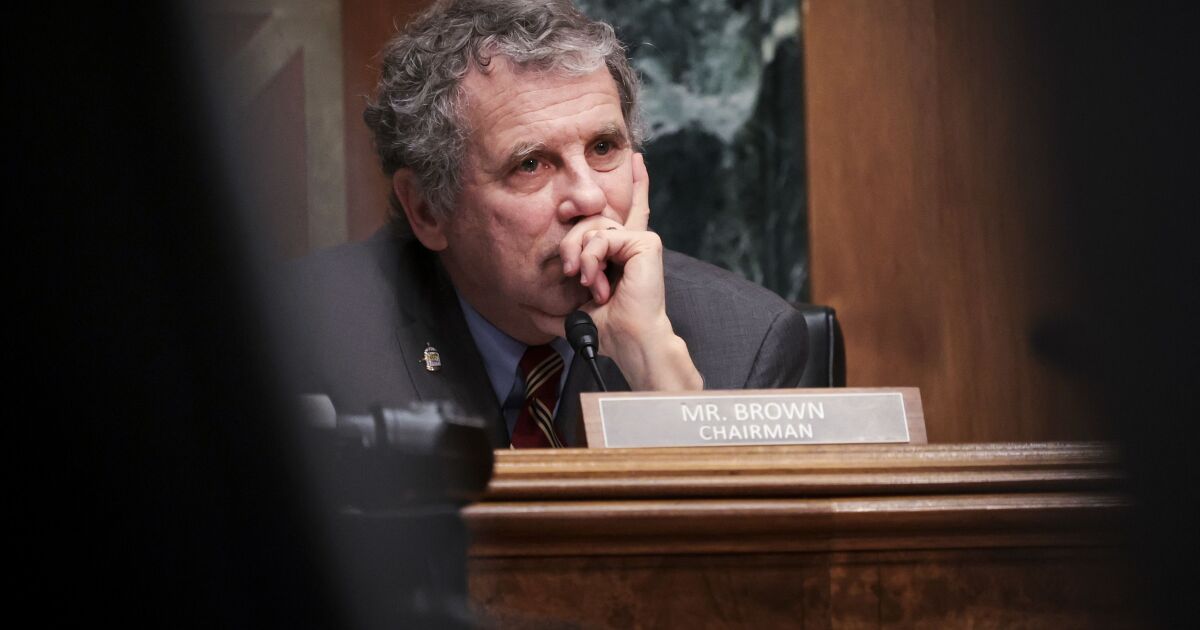
WASHINGTON — The Senate Banking Committee approved the confirmation of the Biden administration's nominees for the Federal Reserve Board and Federal Housing Finance Agency Wednesday evening, ending a weekslong Republican boycott.
In an executive session, the committee voted to advance Jerome Powell as the Fed’s chair, Lael Brainard as vice chair, and Lisa Cook and Philip Jefferson to become Federal Reserve governors. Sandra Thompson, nominated to lead the Federal Housing Finance Agency, was also cleared for a Senate vote.
“This is an historic moment for our country in a whole lot of ways,” said Senate Banking Chair Sherrod Brown, D-Ohio, in opening remarks. “They know economic growth only matters if it shows up beyond corporate balance sheets. And what I love about this team is, not only is it racially diverse and gender diverse — it's experience and ideas diverse.”
Four of the five nominees received the necessary 13 votes from the committee to reach the Senate floor. Cook was the only nominee to see unanimous Republican opposition, resulting in a tie of 12 votes for and 12 votes against her nomination. Under Senate rules, her nomination will be discharged to Senate Majority Leader Chuck Schumer, who can then schedule a floor vote for the nominee at his discretion.
Powell, Brainard, Thompson and Jefferson all received bipartisan support from the committee. Sen. Mike Rounds, R-S.D., was the only Republican to support Thompson for FHFA director, while Sen. Elizabeth Warren, D-Mass., voted against the re-nomination of Powell. Jefferson was the only nominee to be unanimously approved by the committee.
Wednesday night’s development is a welcome one for the White House after months of delays and setbacks for the administration’s financial regulatory nominees. But it also comes just hours after Sarah Bloom Raskin dropped her candidacy to be the Federal Reserve’s vice chair for supervision, one of the government’s top bank regulators. Raskin’s departure was a significant blow for Democrats and climate activists thanks in large part to the opposition of Sen. Joe Manchin, D-W.V.
Since mid-February, Republicans had boycotted the procedural vote that would have moved Raskin and her fellow Fed nominees to the Senate floor, arguing that Raskin would seek to limit credit access for oil and gas firms — a charge Raskin firmly denied. Nonetheless, Manchin was insufficiently convinced.
Raskin’s “previous public statements have failed to satisfactorily address my concerns about the critical importance of financing an ‘all-of-the-above energy policy to meet our nation’s critical energy needs,” Manchin said in a statement on Monday.
With Raskin withdrawing her nomination, Republicans on the Senate Banking Committee promised to cast their votes on the other four candidates swiftly, but the bloc did not commit to supporting the entire slate. While Powell, a Republican, is expected to receive broad support from GOP lawmakers on the Senate floor, other nominees are expected to receive only a smattering of bipartisan support — if any at all.
The surviving Fed nominees will require at least 50 votes to receive Senate confirmation, with Vice President Kamala Harris waiting to cast tie-breaking votes as needed.
On Tuesday evening, Sen. Pat Toomey, R-Pa., the ranking member of the committee and architect of the boycott against Raskin, said he would vote against Gov. Lael Brainard’s nomination for vice chair. Toomey said on a press call that he was concerned Brainard shared Raskin’s sentiment about using the Fed’s regulatory capabilities to target specific industries.
“I am concerned that she has some sympathies for this misuse of the Fed's powers,” Toomey told reporters. “I'm also concerned about how aggressively she's willing to fight inflation, which I think is a huge problem and the Fed is way behind the curve, and for those reasons I'll be voting against confirming her."
Kyle Campbell contributed to this report.



